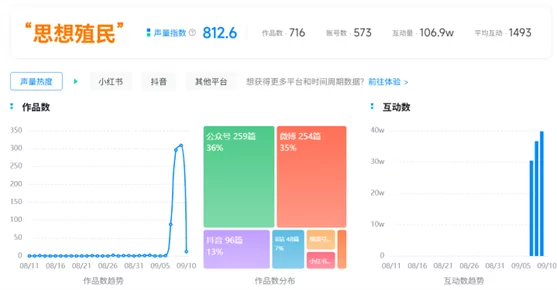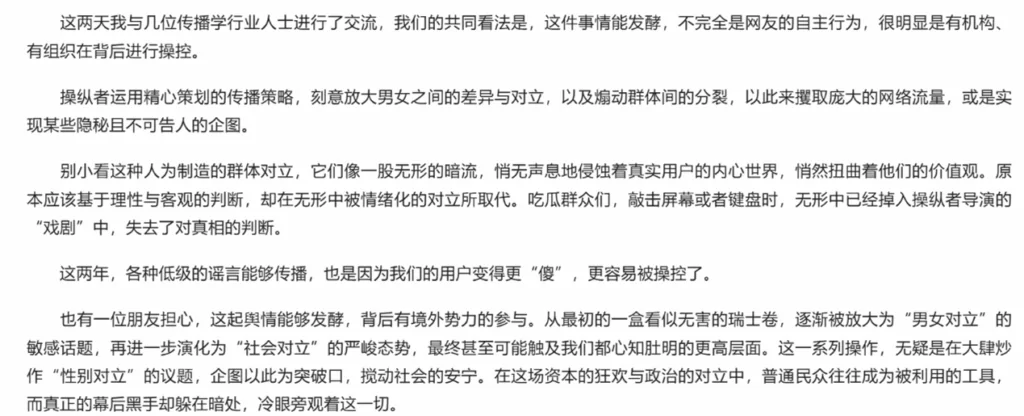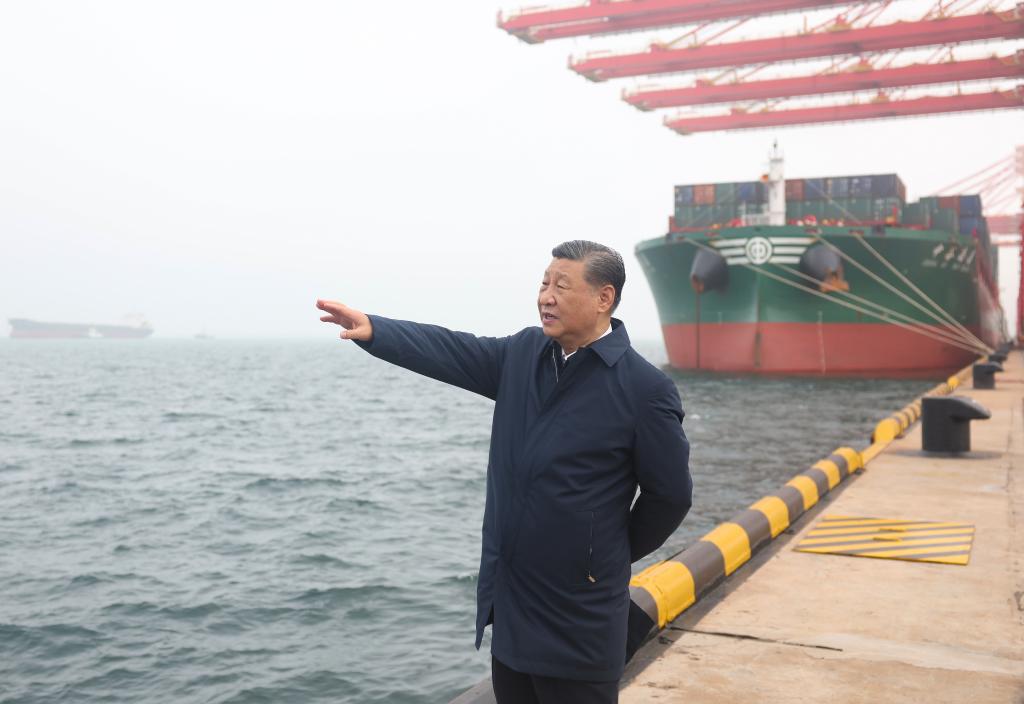
Decoding Beijing’s ‘Colonization of the Mind’ Narrative
Executive Summary:
- A new report by the Xinhua Institute argues that U.S. “cognitive warfare” attempts to “colonize” the minds of people across the world, in particular in global south countries. American influence is framed as ideological infiltration designed to generate social conflicts, undermine stability, and even subvert regimes.
- The consistency of messaging from the PRC indicates that attempts at reassurance from the United States will not be effective in shifting Beijing’s assumptions regarding U.S. intent.
- Media outlets and prominent online commentators in the People’s Republic of China (PRC) often characterize negative domestic news stories as evidence of U.S. infiltration, accusing “foreign forces” while avoiding potential structural explanations for governance failures.
- Beijing sees American cultural strength as one of five forms of hegemony to be eroded, along with political, military, technological, and economic hegemony. It believes it is succeeding in the first three, while it is making steady progress in the economic domain. This latest report represents a further step toward undermining U.S. soft power globally.
On September 7, the Xinhua Institute (新华社研究院), a think tank under Xinhua News Agency, released a report titled “Colonization of the Mind: The Means, Roots, and Global Perils of U.S. Cognitive Warfare” (思想殖民——美国认知战的手段、根源及国际危害). The report was distributed to participants at the 2025 Global South Media Think Tank High-Level Forum (全球南方媒体智库高端论坛) held in Kunming, Yunnan Province (Xinhua, September 8). It also gained traction on social media, where the term “colonization of the mind” saw a spike in exposure compared to other trending internet memes (see Figure 1). Most content related to the term originated from large accounts such as Xinhua News Agency and prominent “key opinion leaders” (KOLs), (see Figure 2).
As with many PRC narratives, the report underscores Beijing’s entrenched view of the United States, one that has proven resistant to external messaging. This consistency reflects not only a propaganda strategy but also a deeply held set of assumptions about U.S. intentions. The report reads less like an analytic study and more like a “tao zei xi wen” (讨贼檄文)—the proclamations common during China’s premodern civil wars that enumerated an enemy’s crimes while rallying support among one’s own forces. It contains three chapters, covering, respectively, the historical background of the so-called “colonization of the mind” worldwide, the methods of this form of influence, and the global harms that it causes . These are followed by a conclusion, in which the report shifts from a combative tone to one of lofty appeal, invoking Xi’s frame for a new world order, the “community of common destiny for mankind” (人类命运共同体), and calling for confident and equal “dialogue and mutual learning” (交流互鉴) (Xinhua, September 7).
The content of the report offers little that is new in terms of accusations against the United States. The five major actions it highlights all have appeared in previous critiques. These include “subverting other governments” (颠覆他国政权), “stoking geopolitical conflicts” (挑拨地缘冲突), “cultivating pro-U.S. forces” (培育亲美势力), “interfering with independent development” (干扰自主发展), and “exacerbating civilizational clashes” (加剧文明冲突) (Xinhua, September 7).
Figure 1: Online Popularity of the term ‘colonization of the mind’

Figure 2: Usage of the Term ‘Colonization of the Mind’ on Social Media

Beijing’s Panacea for Social Conflicts
Some official media outlets and influential online commentators attribute social tensions within PRC society to foreign ideological infiltration. Over time, repeated insinuations regarding foreign interference, such as in Syria or Ukraine, have led people to believe that certain social contradictions confronting the PRC either do not exist or are exaggerated. Those who raise these issues risk being attacked: they are accused of “dai jiezou” (带节奏), a term that originated in video game livestreams to describe steering chatroom discussions for a particular purpose; alternatively, they are labeled as “foreign forces” (境外势力) seeking to undermine PRC society. In one example from 2024, a domestic dispute became a viral story, with a well-known journalist opining that online commentators supporting the wife were either being manipulated by “foreign forces”, or were “foreign forces” themselves, and accusing them of “disturbing social stability” (搅动社会的安宁) (see Figure 3).
The Xinhua Institute report reinforces this narrative that the United States is exporting harmful ideologies to undermine stability or subvert the regime. For those who embrace this narrative, any domestic social tension can be reinterpreted as the product of U.S. ideological infiltration. For example, Guo Jicheng (郭继承), an associate professor at the Marxism Institute of China University of Political Science and Law (中国政法大学马克思主义学院) in Beijing, recently argued on his personal social media that the current skepticism toward traditional Chinese medicine exists only because of “American ideological implants” (美国思想植入) (Douyin/@继承之道, September 9). Beijing’s “colonization of the mind” theory can act as a panacea—a catch-all explanation that shifts the blame for domestic social conflicts onto external forces.
Figure 3: The screenshot of that journalist’s blog

Declaring War on U.S. ‘Cultural Hegemony’
The term “colonization of the mind” is relatively new. It entered common online parlance in the PRC in October 2024, when a Venezuelan scholar published an article on the semi-official nationalist platform Guancha titled “To Achieve Modernization in the Global South, We Must First Decolonize Our Thinking.” (实现全球南方现代化,首先要从思想上去殖民化). The article called on the developing world to respond to Xi Jinping’s appeal to “carry out dialogue among civilizations” (开展文明对话) and to pursue a modernization free from the control and influence of developed countries (Guancha, October 29, 2024). In Chinese official discourse, such modernization is explicitly framed as rejecting the Western path, which it characterizes as “the strong must become hegemonic” (国强必霸) (Party Member’s Net, September 22, 2021; China Brief, May 10, 2024).
According to a 2023 article released by the PRC’s Ministry of Foreign Affairs, Beijing conceptualizes U.S. “hegemony” as comprising five dimensions: political, military, economic, technological, and cultural (MFA, February 20, 2023). From this perspective, Xi’s suite of “global initiatives” (全球倡议) is contributing to a better world through the erosion of U.S. hegemony. A sense of triumphalism can be detected in recent weeks, as the September 3 military parade further reinforced Beijing’s confidence in its own capabilities, leading officials and commentators to suggest that U.S. military hegemony is now over. As Wang Qiang (王强), a professor at National Defense University, declared, the PRC is “outpacing” (领跑) the United States militarily (Kankan News, September 3). Beijing also insists it has already achieved breakthroughs in artificial intelligence, robotics, biotechnology, materials science, deep-sea equipment, and aerospace, effectively overcoming U.S. “technological blockades” (技术封锁) and, to some degree, resolving so-called “chokepoints” (卡脖子) (China News, February 5, 2024; East Money Securities, April 1, 2024; MFA, June 10; Sina Finance, June 30; China Brief, August 9).
This leaves economic and cultural hegemony as the only remaining forms of U.S. hegemony to be defeated. In dismantling U.S. economic hegemony, Beijing has already placed the internationalization of the renminbi and global de-dollarization high on its agenda. This initiative, which has been promoted with increasing fanfare in 2025, is framed as a direct response to Washington’s push for dollar-based stablecoins as an extension of U.S. “hegemonism” (Chinese Academy of Social Sciences, January 21; Tencent News, September 3).
Conclusion
The new Xinhua Institute report forms part of a two-pronged strategy for eroding American cultural hegemony. Its combative rhetoric is designed—in a zero-sum way—to persuade readers that U.S. values are not a source of inspiration, unlike those of the PRC. Still cognizant of the global appeal of American culture, however, the PRC also invests heavily in inviting American influencers to visit the PRC, host livestreams, or even to use American sports as a “bridge” (桥梁) for advancing soft power (Huanqiu, April 13; Baijiahao/@Qianjiang Evening News, July 22; People’s Daily, September 8; Baijiahao/@Jimu News, September 9).
These actions should be seen as part of a wider cognitive framework geared at eroding U.S. influence around the world, which operates in conjunction with similar efforts in other areas of U.S. power. They are actions based on internal assessments of PRC and U.S. power, and as such are likely impervious to attempts at strategic reassurance.


